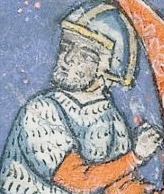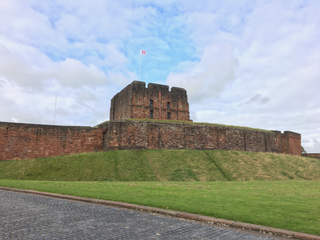This article needs additional citations for verification .(December 2022) |
Contents
Events from the 1210s in the Kingdom of Scotland .
This article needs additional citations for verification .(December 2022) |
Events from the 1210s in the Kingdom of Scotland .
Full date unknown
Full date unknown

Year 1150 (MCL) was a common year starting on Sunday of the Julian calendar.
David of Scotland was a Scottish prince and Earl of Huntingdon. He was the grandson of David I and the younger brother of two Scottish kings, Malcolm the Maiden and William the Lion.

Carlisle Castle is a stone keep medieval fortress located in the city of Carlisle near the ruins of Hadrian's Wall. First built during the reign of William II in 1092 and rebuilt in stone under Henry I in 1122, the castle is over 930 years old and has been the scene of many episodes in British history.
Robert de Brus, 6th Lord of Annandale, jure uxoris Earl of Carrick (1252–1292), Lord of Hartness, Writtle and Hatfield Broad Oak, was a cross-border lord, and participant of the Second Barons' War, Ninth Crusade, Welsh Wars, and First War of Scottish Independence, as well as father to the future king of Scotland Robert the Bruce.

Robert V de Brus, 5th Lord of Annandale, was a feudal lord, justice and constable of Scotland and England, a regent of Scotland, and a competitor for the Scottish throne in 1290/92 in the Great Cause. He is commonly known as "Robert the Competitor". His grandson Robert the Bruce eventually became King of Scots.

The Lordship of Annandale was a sub-comital lordship in southern Scotland (Annandale) established by David I of Scotland by 1124 for his follower Robert de Brus. The following were holders of the office:

Clan Bruce is a Lowlands Scottish clan. It was a royal house in the 14th century, producing two kings of Scotland, and a disputed High King of Ireland, Edward Bruce.

William Comyn was Lord of Badenoch and Earl of Buchan. He was one of the seven children of Richard Comyn, Justiciar of Lothian, and Hextilda of Tynedale. He was born in Scotland, in Altyre, Moray in 1163 and died in Buchan in 1233 where he is buried in Deer Abbey.
Holders of the office of Lord Chamberlain of Scotland are known from about 1124. It was ranked by King Malcolm as the third great Officer of State, called Camerarius Domini Regis, and had a salary of £200 per annum allotted to him. He anciently collected the revenues of the Crown, at least before Scotland had a Treasurer, of which office there is no vestige until the restoration of King James I when he disbursed the money necessary for the maintenance of the King's Household.

Robert I de Brus, 1st Lord of Annandale was an early-12th-century Anglo-Norman lord and the first of the Bruce dynasty to hold lands in Scotland. A monastic patron, he is remembered as the founder of Gisborough Priory in Yorkshire, England, in present-day Redcar and Cleveland, in 1119.
Events from the 1210s in England.
Matilda of Chester, Countess of Huntingdon was an Anglo-Norman noblewoman, sometimes known as Maud and sometimes known with the surname de Kevelioc. She was a daughter of Hugh de Kevelioc, 5th Earl of Chester, and the wife of David of Scotland, Earl of Huntingdon.
Robert de Vieuxpont, also called Vipont, Veteripont, or de Vetere Ponte, Baron of Westmorland, was an Anglo-Norman noble landowner and administrator.
Geoffrey de Neville was an English nobleman who served as King's Chamberlain and Seneschal of Gascony and Périgord.
Brus or de Brus is a surname with multiple origins. Notable people include:
Events from the 1290s in Scotland.
Events from the 1240s in the Kingdom of Scotland.
Events from the 1230s in the Kingdom of Scotland.